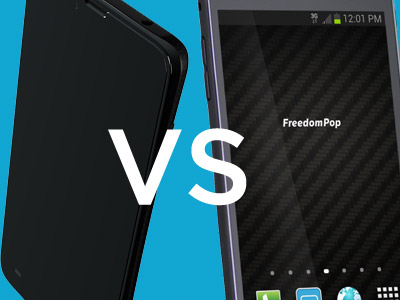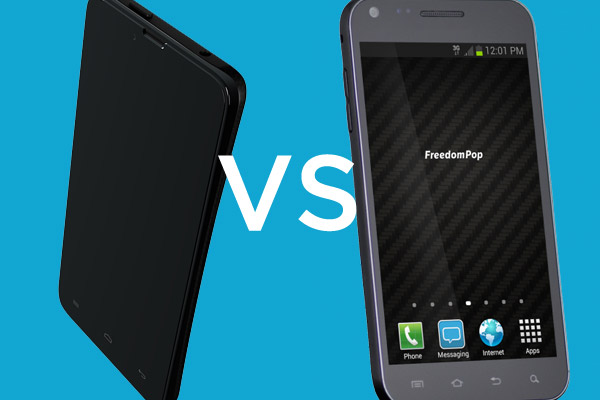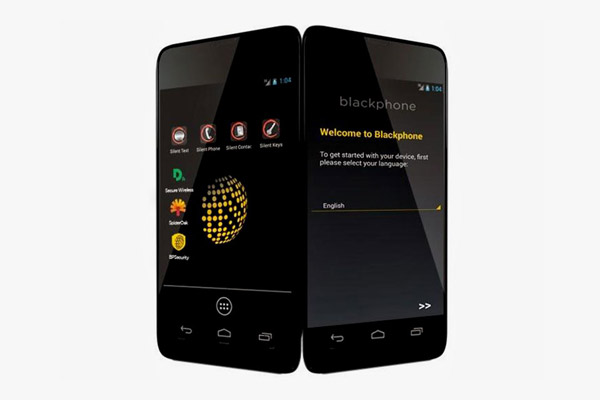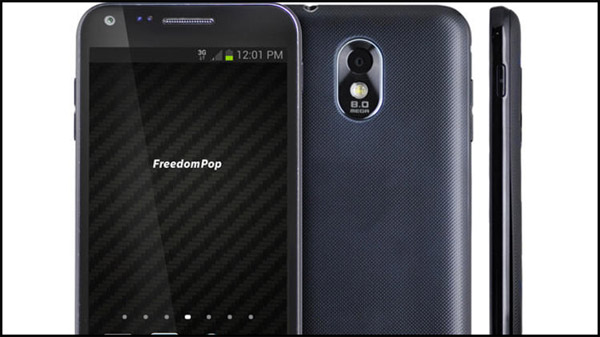Blackphone vs. FreedomPop's Privacy Phone: Security Showdown
Want a private phone? We compare FreedomPop's "Privacy Phone" and the Blackphone from Silent Circle and Geeksphone.


Last summer, Edward Snowden transformed online security and privacy from a niche subject into a household concern. It's no coincidence, then, that less than a year later, two different tech companies are releasing so-called "private" phones.
The Freedom Privacy Phone, by Internet service and smartphone 4G provider FreedomPop, is available now. It comes preloaded with far more security and privacy features than just about any other phone.
MORE: 7 Ways to NSA-Proof Your Phone
The one exception may be Blackphone. Co-created by Maryland-based mobile-privacy software developer Silent Circle and Spanish hardware startup Geeksphone, Blackphone — which will begin shipping to customers in June — also promises usable and secure privacy.
How do these two phones work, and how do they stack up against each other? Here's what we know about the Privacy Phone and Blackphone.
Hardware and operating system
Like one of FreedomPop's "regular" phones, the Privacy Phone is a refurbished Samsung Galaxy S II running Android 4.1 Jelly Bean.
Sign up to get the BEST of Tom's Guide direct to your inbox.
Get instant access to breaking news, the hottest reviews, great deals and helpful tips.
A three-year-old phone, the Galaxy S II is long in the tooth when it comes to specs. It has a small 4.3-inch (800 x 480-pixel screen), a 1.5-GHz dual-core CPU and an 8-MP camera. The device is 3G only.
When asked if using a three-year-old phone with an outdated operating system would create any potential security or privacy issues, FreedomPop Chief Operating Officer Steven Sesar said, "No."
Blackphone is a custom-designed handset by Geeksphone. It runs a modified version of Android, with added security features, called PrivatOS, that can nevertheless run apps from the Google Play store.
The Blackphone features a 2-GHz quad-core processor with 2GB of RAM, a 4.7-inch HD display and an 8-MP camera with flash. The handset supports LTE and 802.11n Wi-Fi.
Calling and texting
FreedomPop's $189 Privacy Phone doesn't use regular cellular voice and text channels; rather, calling and texting is done via VoIP (voice over IP) on the phone's Wi-Fi or 3G connection. That connection uses Sprint's Clearwire WiMAX service, available in 88 U.S. cites, as well as Sprint's regular 3G network.
Because of the VPN, Sesar said, "We're able to encrypt our data-delivered calls and texts."
MORE: Mobile Security Guide: Everything You Need to Know
Blackphone, on the other hand, is unlocked; it's up to the user to select a carrier.

"Blackphone is an unlocked GSM cellphone, so you can use it on any GSM-based cell carrier network, like T-Mobile or AT&T here in the U.S. — you just buy a data plan and go," explained Silent Circle spokesman Tom Resau. "Or, if you just wanted to run it off Wi-Fi networks, you could do that, too."
Blackphone comes preloaded with Silent Circle's own privacy apps, including Silent Phone and Silent Text, which are VoIP-based. A two-year subscription to both is included in the Blackphone's price of $629.
"In theory, a carrier could block VoIP, but there are so many mainstream VoIP tools now that it would likely not be a commercial success for them to do so," said Toby Weir-Jones, managing director at Blackphone. "Our goal is not to take you off the grid — it's to give you the wherewithal to decide what details to reveal, while keeping everything else private by default."
The downside to using Silent Phone and Silent Text is that, as with other secure communications apps, they can only be used to talk to other people who use the same apps. To mitigate that problem, Blackphone comes with three free one-year subscriptions to Silent Circle apps you can give to friends.
Blackphone also runs a specially modified version of Android called PrivatOS that promises to build in privacy right down to the root level. The Blackphone company will handle all operating-system updates.
Anonymity and Web browsing
FreedomPop's Sesar said all Web traffic to and from the Privacy Phone is anonymous because the "IP address is anonymous and [an] anonymous browser doesn't store personal information."
He explained that the Privacy Phone uses the commercial virtual private network (VPN) client Private WiFi to encrypt and anonymize all traffic on the phone. (Private WiFi provides anonymity by masking the phone's IP address with one of its own.)
MORE: 7 Ways to Lock Down Your Online Privacy
Sesar said the VPN also lets the phone's Web browser "bypass any website restrictions and connect to any site online," meaning it can get around location-specific restrictions, but not paywalls.
When asked about the difference between privacy and anonymity, Sesar said the two concepts are interchangeable.

"I can navigate through the Internet anonymously, meaning no one can track that to my IP address," he said. "That gives me privacy about who I am, so people can't trace that back."
Blackphone, on the other hand, will use the Disconnect Secure Wireless mobile VPN client, not yet commercially available, to anonymize "all of Blackphone," Weir-Jones said. (Disconnect's website claims the mobile client will work on 3G and 4G cellular networks as well as Wi-Fi.)
"Disconnect Search and Secure Wireless are anonymous, as well as private, in the sense that Disconnect doesn't track any personal information," said Disconnect co-founder and co-CEO Casey Oppenheim. "These services also prevent companies from associating your browsing and searches with your IP address."
Anti-virus protection and other features
Privacy Phone uses the Kaspersky Internet Security for Android anti-virus app to keep the phone safe from malware and to block malicious websites. It also uses the Kaspersky app's built-in whitelist and blacklistfeatures to let users block unwanted calls and texts.
Blackphone, however, has no preloaded anti-virus software.
"We chose not to put one of the standard commercial anti-malware packages on Blackphone," Weir-Jones said. "They are all intrusive to some greater or lesser degree, and we had no transparency into exactly how they worked."
MORE: Best Anti-Virus Software 2014
For example, Kaspersky Labs, maker of Kaspersky Internet Security, is based in Moscow and sometimes works closely with Russian authorities. It's unlikely that FreedomPop's Privacy Phone would be cleared for U.S. government use.
Weir-Jones said Blackphone doesn't need anti-virus software.
"The protections about rogue app installations and data leakage are already handled by the Blackphone Security Center," he said, "and, to date, there haven't been any stand-alone Android viruses anyway."
Blackphone's "Security Center" will also let users control what each installed app on the phone can do — an "à la carte" permissions menu that Android privacy experts have sought for years.
Regular Android has an "all or nothing" permissions menu. The user must either accept all of an app's requested permissions, or reject the app outright.
Because PrivatOS "roots" the Android OS, it lets users choose among an app's permissions. Other privacy apps, such as Lookout Mobile Security and Clueful by Bitdefender, can only show you which apps have access to which permissions.
Anti-theft
The Privacy Phone's anti-theft features rely on Kaspersky Internet Protection, which can remotely lock, locate and wipe a missing phone. The phone can also be set to hide all call data, including contacts, calls, texts and logs.
Blackphone will come with remote-wipe and anti-theft features built into the phone's OS.
Value
The Privacy Phone costs $189 up front, which includes three months of unlimited voice and texting and 500MB of monthly data. After that, the phone costs $10 per month. Alternatively, Privacy Phone can be purchased with bitcoins to further protect users' privacy.
MORE: What is Bitcoin?
Blackphone, on the other hand, will cost $629 up front before a carrier pay-as-you-go plan. The $629 includes subscription fees to a number of highly reputable and secure services, including two years of Silent Circle (normally $240). You also get three one-year Silent Circle subscriptions to give to your friends and family ($360), two years of secure encrypted cloud storage service SpiderOak ($120) and two years of Disconnect ($120).
Bottom line
Both FreedomPop and Silent Circle admit that their phones are not 100 percent secure. But then again, as both companies point out, nothing is.
"We do not make claims that the Privacy Phone is NSA-proof," Sesar said. "Rather, we're providing an additional layer of privacy protection and Internet security from third parties that other phones do not currently provide."
Blackphone's Weir-Jones added, "Bad guys wanting to talk to each other probably shouldn't be using a phone at all," he told TechCrunch.
After we looked at the phones' features and spoke with the developers, it seems that Blackphone has the more serious security chops, but we'll know more when we go hands-on with both devices.
Email jscharr@techmedianetwork.com or follow her @JillScharr and Google+. Follow us @TomsGuide, on Facebook and on Google+.
Jill Scharr is a creative writer and narrative designer in the videogame industry. She's currently Project Lead Writer at the games studio Harebrained Schemes, and has also worked at Bungie. Prior to that she worked as a Staff Writer for Tom's Guide, covering video games, online security, 3D printing and tech innovation among many subjects.
-
Dustin Cannon Sorry but having an NSA proof to make people feel better because their traitor hero Snowden told them the evil goverment is spying on them isn't going to do squat when they tweet the world that their boss Mr. X is a so and so or that picture of their junk they thought was NSA proof gets automatically backed up to Google+ and put on their public profile.Reply -
mySecure_Phone : If we are talking about the security and the privacy we have to mention about eavesdropping (like you did). To encrypt emails, texts and calls, you don't need to buy Blackphone. There are a professional apps and software available on the market. One of them is mySecurePhone. It's designed for any smartphones with Android. Additionally, it is compatible with any email account, so allows you to keep your favourite one.Reply
